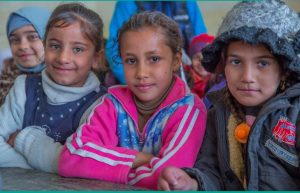… EDUCATION FOR PEACE …
An article from Theirworld: A brighter future for every child (reprinted by permission)
At least 320 schools have reopened in eastern Mosul and nearby towns – allowing around 258,000 children to return to education while fighting continues in the west of the embattled Iraqi city. Some of the children had been out of school for more than two years, with girls largely banned from getting an education by the terror group Islamic State.

Heba, Noor, and Janna in a classroom at a recently reopened school in eastern Mosul, Iraq — UNICEF / Anmar
In February, UNICEF provided learning materials including science and maths kits to 87 of the East Mosul schools, reaching 73,780 children including 31,890 girls. The United Nations children’s agency said the need for furniture, teaching materials, and teacher training remains a challenge.
Concern about unexploded devices in and around schools is high. But with only a limited number of agencies authorised to deliver Mine Risk Education (MRE) sessions, the authorities are concerned. In Anbar province, MRE took place in 50 schools, with awareness and safety messages reaching an estimated 25,000 students, including about 45% of girls.
Paul St. John Frisoli, a senior education technical adviser on the Middle East region for the International Rescue Committee, said schools in Mosul can save children’s lives by giving student, teachers, school staff and parents crucial life-saving information about mine awareness.
In a blog for Refugees Deeply, he added: “IRC staff deployed into recently retaken villages and displacement camps around Mosul have observed high rates of distress among children and families.
(Article continued in right column)
What is the relation between peace and education?
A culture of peace in Iraq, Is it possible?
(Article continued from left column)
“Education can help children cope with the consequences of conflict by providing a secure, predictable and nurturing environment. Having access to education offers children hope for and a sense of control over their future during crisis.”
Millions of children across the world miss out on school as a result of humanitarian emergencies including conflicts, natural disasters and health crises. Education can be lifesaving – not being in school in emergencies can leave children at risk of child labour, early marriage, exploitation and recruitment into child labour.
Military operations to retake western parts Iraq’s second largest city started on February 19 after Iraqi forces were successful in removing the terror group from the east.
The United Nations estimates that around 750,000 civilians remain inside the western section of the city.
Humanitarian groups are deeply concerned about the situation of civilians trapped there, including around 412,000 children.
Since February 19, more than 31,500 people – including 14,800 children – have been displaced from West Mosul. The majority of people have been sent to new IDP camps in south Ninewa.
In January, 70 schools reopened in Mosul. Hessam al-Din Abar, a representative at the Provincial Council in Nineveh, where Mosul is the capital, said schools had been turned into places for terrorists to train new recruits and promote extremism.
Many families would not allow their children to attend schools while ISIL – which seized the city in 2014 – was controlling them.
An estimated 3.5 million Iraqi children are missing out on education.
(Thank you to Janet Hudgins, the CPNN reporter for this article.)